The Political Parties Registration Commission (PPRC) has completed a three-day national validation conference on reforms of the Political Parties Act (PPA) with support from European Union and the UNDP.
Awoko reports that PPRC Chairmain, Abdulai M Bangurah said that people always ask what is the Commission doing when political parties are misconducting themselves all over the place, breaching the peace and fighting amongst themselves. The answer he said is simple, even though the Commission was constituted to regulate political parties they are unable to do anything because they do not have the powers.
Speaking on the reform, he said that they will now give them the requisite powers, so when they see any of those things happening they will go in as of right, for example, before now they can only go in and mediate intra-party politics when they are approached by the leadership of the political party.
“Most times the leadership of those parties are the very ones in conflict, so, they don’t come to us, but by the resolutions passed here we have been given the right to move in when we sense any dispute within political parties or amongst political parties to mediate and come out with a resolution. This will enhance our oversight authority if passed in Parliament” he said.
The Chair said that the PPA 2002 did not give them enough regulatory powers and that what they have at the moment are supervisory powers. “We are a regulatory body with absolutely no regulatory power, other than the ultimate one to deregister political party, that seems to be the omnibus regulatory power conferred on us for every contravention of our Act” he said. “We thought that it is inadequate and that is a regulatory power that we normally do not want to have recourse to, because to us, it is very extreme.”
The Commission he said, decided that they have a review based on the recommendations of Elections Observation Missions (EOM) in 2018. They noticed the limitation and therefore decided that the Act be reviewed with the intention of repealing and replacing it, so that, their mandate be strengthened to enable PPRC perform their functions effectively.
Several number of reviews he said were undertaken during the three-days that will be subject to Cabinet concurrence and eventually Parliament. They started off with a name change that does not only capture registration as they also regulate. “We do not only register but also regulate, we recommended two names Political Parties Commission and Political Parties Regulation Commission.”
As a Commission they have advocated for more enlarged regulatory powers, such as fines, suspensions, those intermediate regulatory powers that are not the extreme ones, were agreed and adopted.
It was also recommended that when an executive of a political party is appointed to ministerial positions or to head parastatals they should resign because this they say will blur the lines and that was a recommendation focused on by the EMB’s also.
The Commission put forward 42 recommendations and 37 were approved. From the five that were rejected, Chair Bangurah said that they proposed that they do not want to have the right to deregister any party as normally when they resort to using that regulatory power the accusations are that the PPRC is prejudiced by going after political parties that they do not like.
It was proposed that the deregistration be done by the electorate, if they do not meet a particular threshold in any election they participated in whether parliamentary, local council, presidential and getting at least 2 percent of total vote cast, that should be a reason to deregister. “It means that, you do not have the electoral pedigree for you to exist as a political party, they rejected it” he said.
The political parties also rejected the recommendation that before you register as a political party they should provide PPRC with evidence of membership from all the 16 electoral district of at least 300 from each district.
“I am satisfied with the more than 98 percent approved proposals. All what has been approved here will be taken to the Attorney General in the form of legislative authority, we are under the Presidency, he takes it to Cabinet for us as soon as possible” he hoped.
He added that, the Commission will also engage the National Electoral Commission as there are so many issues of conflict between the two bodies especially when it comes to campaign trail, that they need to identify their roles, as the areas that are intertwined needs to be addressed.


 Post a comment
Post a comment 








